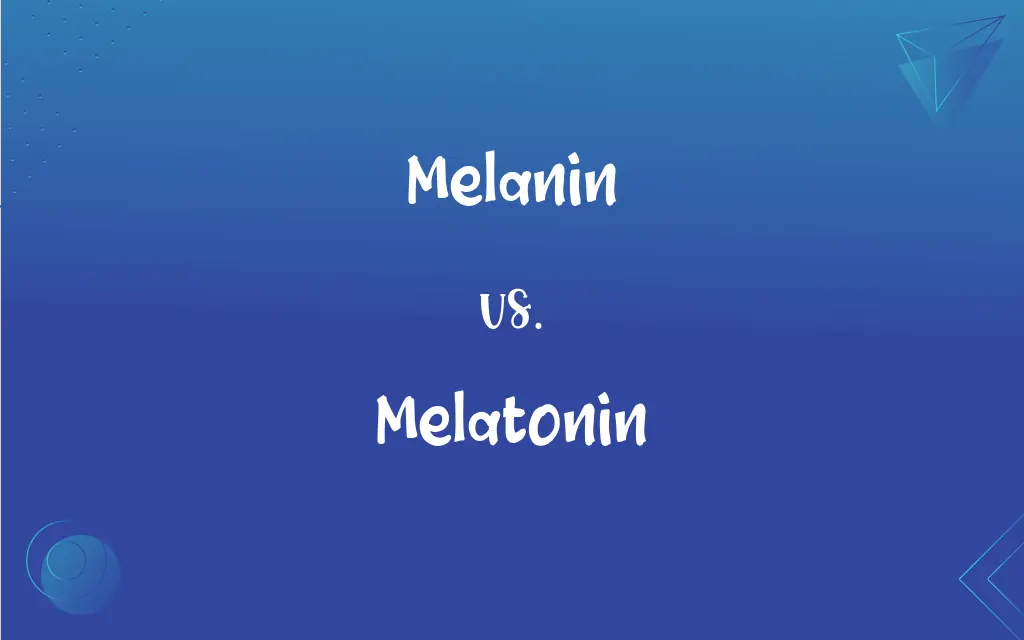Melanin vs. Melatonin: What's the Difference?
Edited by Janet White || By Harlon Moss || Updated on October 10, 2023
Melanin is a pigment that determines skin, hair, and eye color, while melatonin is a hormone that regulates sleep-wake cycles.

Key Differences
Melanin and melatonin serve distinct roles in the human body, with the former being a pigment and the latter a hormone, each contributing significantly to our physiological functioning and physical appearance. Melanin primarily influences the color of our skin, hair, and eyes, with higher concentrations resulting in darker pigmentation, acting as a protective agent against the harmful effects of ultraviolet (UV) radiation from the sun. In contrast, melatonin is secreted by the pineal gland in the brain and plays a pivotal role in regulating our sleep-wake cycle, with its release being stimulated by darkness and suppressed by light, intricately aligning our bodily functions with the external environment's diurnal rhythms.
Despite their disparities, melanin and melatonin share a connection through their involvement with light and its impact on our bodies, each responding to it in unique and crucial ways. Melanin's capacity to absorb and disperse UV radiation not only shields our skin cells from potential damage but also assists in preventing conditions such as sunburn and minimizing the risk of skin cancer. Melatonin, while unrelated to pigmentation, interacts with light in its capacity to manage our circadian rhythms, modulating our sleep patterns and thereby impacting our overall health, wellness, and daily functionality, demonstrating the diverse yet integral ways in which our bodies navigate and negotiate light's influences.
Melanin and melatonin, while embodying different biochemical entities and functions, also exhibit disparate distribution and manifestation within our bodily systems, shaping our physiological and physical attributes in varied ways. Melanin is predominantly found in the skin, providing pigmentation, but is also present in the hair and the iris of the eyes, impacting our physical appearance and visual capabilities. Conversely, melatonin does not influence physical traits but permeates our systemic functioning, with its secretion impacting not only our sleep patterns but also various physiological processes, such as antioxidant defenses and modulation of immune responses, underpinning diverse aspects of our health and vitality.
Considering the biological synthesis of melanin and melatonin unveils further distinctions between these two entities, with each being produced through different biochemical pathways and from different precursor molecules. Melanin is synthesized in melanosomes within melanocytes, originating from the amino acid tyrosine, and is then distributed to keratinocytes, influencing skin, hair, and eye color. Melatonin, although also derived from an amino acid – tryptophan – undergoes a different synthetic pathway, involving its conversion to serotonin before being transformed into melatonin in the pineal gland, reflecting the unique biosynthetic journeys that culminate in their varied physiological roles and influences.
In exploring the broader impacts and implications of melanin and melatonin, each emerges as symbolically and scientifically significant within various cultural, medical, and scientific contexts. Melanin, through its determination of pigmentation, has various sociocultural implications and has been a focal point in studies exploring the genetic diversity and evolution of skin color amongst different human populations. Melatonin, while perhaps less visibly evident, has garnered attention within medical and scientific realms, being explored for its potential in managing sleep disorders, mitigating jet lag, and understanding its broader impacts on health, revealing the multifaceted ways in which these two distinct entities weave into our lives and understandings.
ADVERTISEMENT
Comparison Chart
Definition
Natural pigment in organisms
Hormone secreted by the pineal gland
Primary Function
Provides color to skin, hair, and eyes and protects from UV rays
Regulates sleep-wake cycle
Production Factors
Genetics and sun exposure
Light exposure and circadian rhythms
Location
Skin, hair, eyes
Pineal gland in the brain
Associated Risks
Overexposure can lead to skin damage
Imbalance can affect sleep patterns
ADVERTISEMENT
Melanin and Melatonin Definitions
Melanin
A natural substance determining the darkness of tissues.
Her dark hair is due to a high concentration of melanin.
Melatonin
A secretion from the pineal gland.
The pineal gland releases melatonin in response to darkness.
Melanin
A compound present in varying amounts across individuals.
People produce different amounts of melanin, leading to a spectrum of skin tones.
Melatonin
A key player in the body's internal clock.
Melatonin signals the body when it's time to sleep.
Melanin
A protective agent against UV radiation damage.
Melanin helps shield the skin from harmful sun rays.
Melatonin
An agent affecting sleep patterns.
High levels of melatonin make you feel sleepy.
Melanin
A primary factor in visual and physical appearance.
The varying levels of melanin result in diverse hair colors.
Melatonin
A natural compound influenced by light exposure.
Exposure to screens before bedtime can disrupt melatonin production.
Melanin
A pigment responsible for skin, hair, and eye color.
People with more melanin in their skin tan more easily.
Melatonin
A hormone regulating sleep and wakefulness.
Taking melatonin supplements can help with jet lag.
Melanin
Any of a group of naturally occurring dark pigments, especially the pigment found in skin, hair, fur, and feathers.
Melatonin
An animal hormone, C13H16N2O2, derived from serotonin and produced by the pineal gland. It stimulates color change in the skin of amphibians and reptiles and plays a role in regulating circadian rhythms and reproductive cycles in mammals. It is also found in plants and fungi.
Melanin
(biochemistry) Any of a group of naturally occurring dark pigments, especially the pigment found in skin, hair, fur, and feathers.
Melatonin
A hormone, related to serotonin, that is secreted by the pineal gland, and stimulates colour change in the skin of reptiles, and is involved in the sleep/wake and reproductive cycles in mammals.
Melanin
A black pigment found in the pigment-bearing cells of the skin (particularly in the skin of the negro), in the epithelial cells of the external layer of the retina (then called fuscin), in the outer layer of the choroid, and elsewhere. It is supposed to be derived from the decomposition of hemoglobin.
Melatonin
Any material similar in its chemistry and effect to the natural hormone.
Melanin
Insoluble pigments that account for the color of e.g. skin and scales and feathers
Melatonin
A hormone secreted by the pineal gland. Chemically it is N-acety-5-methoxytryptamine. Research has indicated that there are daily rhythms in secretion of melatonin, in particular due to the depressing effect on melatonin production by light received by the retina. Conversely it appears that melatonin may influence the circadian rhythms of animals. There is some experimental evidence that administration of melatonin may increase the amount of sleep in people with sleep disorders. However, the evidence is not convincing and the effect is not profound. Nevertheless, the deregulation of melatonin and its availability over-the-counter has led to many people taking melatonin to help sleep, without consulting a physician.
A role for melatonin in sleep facilitation has been inferred from its effect on electroencephalogram patterns, but it has not been possible to demonstrate that wakefulness sleep cycles are driven by periodic accumulation, depletion, or regeneration of melatonin.
Melatonin
Hormone secreted by the pineal gland
FAQs
Why is melanin important for skin health?
Melanin protects the skin from harmful UV radiation, reducing skin cancer risks.
What is melanin?
Melanin is a natural pigment that determines the color of skin, hair, and eyes.
How does melatonin differ from melanin?
Melatonin is a hormone that regulates sleep, while melanin affects skin, hair, and eye color.
Does melanin determine hair color?
Yes, melanin levels and types determine hair color and its shade.
What factors affect melatonin production?
Light exposure, especially blue light, can influence melatonin levels.
Is a tan an increase in melanin?
Yes, tanning is the skin's response to UV exposure by increasing melanin production.
Can melatonin be produced naturally in the body?
Yes, the pineal gland naturally produces melatonin in response to darkness.
Is the amount of melanin in the eyes related to sight?
While melanin can protect eyes from UV damage, it doesn't directly affect vision quality.
Is melatonin only related to sleep?
While primarily associated with sleep, melatonin also plays roles in immune function and antioxidant activity.
Does melanin have any other functions besides coloration?
Yes, melanin also protects against UV radiation and contributes to inner ear functioning.
Can changes in diet affect melatonin levels?
Some foods like cherries and grapes contain melatonin, but diet alone isn't a primary influencer of melatonin production.
What role does melatonin play in the body?
Melatonin regulates the sleep-wake cycle and helps maintain circadian rhythms.
How can one increase melanin production?
Sun exposure can stimulate melanin production, but overexposure can be harmful.
Can melatonin be taken as a supplement?
Yes, melatonin is available as an over-the-counter supplement to aid sleep.
Do all humans have melanin?
Yes, all humans have melanin, but the type and amount vary among individuals.
How does screen time affect melatonin?
Blue light from screens can suppress melatonin production, disrupting sleep patterns.
Are there side effects to melatonin supplements?
Possible side effects include dizziness, headache, and nausea, but they're generally considered safe for short-term use.
How does melatonin help with jet lag?
Melatonin can help reset the body's internal clock to a new time zone.
Why do some people freckle?
Freckles are small areas where melanin is produced in higher amounts.
Can melanin be reduced in the body?
There are treatments and procedures to reduce melanin, but they can carry risks.
About Author
Written by
Harlon MossHarlon is a seasoned quality moderator and accomplished content writer for Difference Wiki. An alumnus of the prestigious University of California, he earned his degree in Computer Science. Leveraging his academic background, Harlon brings a meticulous and informed perspective to his work, ensuring content accuracy and excellence.
Edited by
Janet WhiteJanet White has been an esteemed writer and blogger for Difference Wiki. Holding a Master's degree in Science and Medical Journalism from the prestigious Boston University, she has consistently demonstrated her expertise and passion for her field. When she's not immersed in her work, Janet relishes her time exercising, delving into a good book, and cherishing moments with friends and family.































































